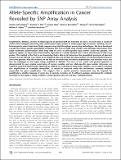Allele-Specific Amplification in Cancer Revealed by SNP Array Analysis

View/
Author
LaFramboise, Thomas
Zhao, Xiaojun
Sellers, William R
Published Version
https://doi.org/10.1371/journal.pcbi.0010065Metadata
Show full item recordCitation
LaFramboise, Thomas, Barbara A. Weir, Xiaojun Zhao, Rameen Beroukhim, Cheng Li, David Harrington, William R. Sellers, and Matthew Meyerson. 2005. Allele-Specific amplification in cancer revealed by SNP array analysis. PLoS Computational Biology 1(6): e65.Abstract
Amplification, deletion, and loss of heterozygosity of genomic DNA are hallmarks of cancer. In recent years a variety of studies have emerged measuring total chromosomal copy number at increasingly high resolution. Similarly, loss-of-heterozygosity events have been finely mapped using high-throughput genotyping technologies. We have developed a probe-level allele-specific quantitation procedure that extracts both copy number and allelotype information from single nucleotide polymorphism (SNP) array data to arrive at allele-specific copy number across the genome. Our approach applies an expectation-maximization algorithm to a model derived from a novel classification of SNP array probes. This method is the first to our knowledge that is able to (a) determine the generalized genotype of aberrant samples at each SNP site (e.g., CCCCT at an amplified site), and (b) infer the copy number of each parental chromosome across the genome. With this method, we are able to determine not just where amplifications and deletions occur, but also the haplotype of the region being amplified or deleted. The merit of our model and general approach is demonstrated by very precise genotyping of normal samples, and our allele-specific copy number inferences are validated using PCR experiments. Applying our method to a collection of lung cancer samples, we are able to conclude that amplification is essentially monoallelic, as would be expected under the mechanisms currently believed responsible for gene amplification. This suggests that a specific parental chromosome may be targeted for amplification, whether because of germ line or somatic variation. An R software package containing the methods described in this paper is freely available at http://genome.dfci.harvard.edu/~tlaframb/PLASQ.Other Sources
http://www.ncbi.nlm.nih.gov/pmc/articles/PMC1289392/pdf/Terms of Use
This article is made available under the terms and conditions applicable to Other Posted Material, as set forth at http://nrs.harvard.edu/urn-3:HUL.InstRepos:dash.current.terms-of-use#LAACitable link to this page
http://nrs.harvard.edu/urn-3:HUL.InstRepos:8350341
Collections
- HMS Scholarly Articles [17922]
- SPH Scholarly Articles [6362]
Contact administrator regarding this item (to report mistakes or request changes)


